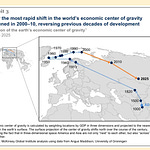A version of this essay was published by firstpost.com at https://www.firstpost.com/opinion/shadow-warrior-permanent-interests-not-permanent-friends-drive-foreign-policy-12814872.html
The optics for PM Narendra Modi’s visit to the US were good. There was a surprisingly positive reception to his speech to the joint houses of the US Parliament (known as the US Congress, not to be confused with the Indian political party with its congenital allergy to Modi). I read that the PM gave a bravura performance, and that he was interrupted by several standing ovations.
The rest of the trip also got generally good reviews. It would be wonderful if my two favorite nations were to become good friends. I lived most of my youth in the US, and I love the country. By ancestry and culture, of course my roots are Indian.
But any such rapport will not come about if the usual suspects can help it. I was not really surprised by the news that former President Barak Obama was scathing about India and Modi. I have not been a fan of Obama’s from day one: something about him made my antennae go up. And then I heard that he had gone to Pakistan in his youth, at a stage in life when most young Americans go to India to find themselves. I guess Obama had already found himself.
Then there was Fareed Zakaria who echoed the libel that India was massacring Muslims. He knows well enough that this is not true. If anything, Indian Muslims are more privileged than others. And Zakaria and his father are among the most privileged, a super-elite caste of “Anglo-Mughalais” (my friend Bapa Rao’s evocative term) who take advantage of everything India has to offer, in the name of the poorer castes of Muslims whom they find it convenient to keep poor and angry.
And then there was Sabrina Siddiqui, a Pakistani-American journalist who is part of the Biden administration, whose provocative question to the PM raised hackles.
The meme that is quietly being propagated by all of them is that India is on the verge of genocide of its Muslim residents. This is simply not true: just as they are currently doing in France, Muslims riot at the drop of a hat in India. This is hardly a dara hua population. Obama’s direct hint about a Partition 2.0 is a good summary of the standard Deep State perspective on India: keep it down, poor, and preferably broken: Hindus are not allowed to rise.
Less sinister was some guy in Foreign Affairs opining that the US and India do not share ‘values’ but only ‘interests’. Maybe, but that should not stop them from becoming friends. That is realpolitik: the enlightened pursuit of self-interest. Nations, in a Chanakyan way, can and should pursue their own long-term and short-term interests. I once invoked Chanakya’s ‘Far Emperor’: you cultivate the distant emperor to wage war against the neighbor, who, sadly, will sooner or later become your foe. That’s a good model for India. A benign US can be the Far Emperor when the nearby power threatens.
As for the US, with a rampaging China threatening to overturn the entire US-dominated international order, it is good to have friends who can keep China occupied in its neighborhood: to put it crudely, India is the only country to have recently killed Chinese troops, and stared them down in a tense stand-off.
And values. I have to believe that the guiding values of the US are “life, liberty and the pursuit of happiness”. So far as I can tell, this is exactly what India is attempting to do for its citizens and this is precisely what the much-maligned (by the US Deep State) Modi is trying to do. How much more congruent can your values get?
But I must acknowledge that there is a definite gulf between Abrahamic values and Dharmic values.
The ‘religions of the desert’, that is, Abrahamisms including the Christian, Islamic and Communist faiths, have as a central tenet world conquest. I classify Abrahamisms as follows:
Paleo-semitic: Zoroastrianism, Judaism
Meso-semitic: Christianity, Islam
Neo-semitic: Communism, Fascism, Nehruism, Ambedkarism, Dravidianism, and so on
The common thread is that these are prone to promote competition and zero-sum games. This is a consequence of the fact that the Middle East, where these ideologies germinated (though they have obviously managed to capture much territory elsewhere) is mostly a fearsome desert. If you do not follow a few simple rules (‘Commandments’) you will perish: for instance, “carry water”, “cover yourself up against the sun and sand”, “kill or be killed”, “your life here and now may suck, but there’s a heaven after you die and if you want to get there, do the following”.
The Dharmic worldview, being that of the ‘religions of the forest’, is fundamentally different. This is because the Asian forest, while it can be dangerous, is benign. There are fruits to forage for, and water to drink. Your basic survival is not in such jeopardy, and so you can afford to be a little flexible. Of course there are rules like “look out for snakes”, and “climb a tree to escape predators”, but basically life is easier, and so you develop an attitude of “live and let live”.
I have recently been traveling in Europe, and spent some time in the Louvre Museum. The items on display there are a graphic reminder of these differences: the galleries showing Greek, Roman, Persian and Mediterranean art (pre-Abrahamic) are radically different from medieval (Abrahamic) art from later times. Yes, there is a difference ever since meso-Semitism became the European standard.
The biologist Richard Dawkins is a good example of the fact that Abrahamic values are the norm for anyone in the West, even if they reject Abrahamic religions, and claim to be atheists, although one could easily argue that atheism is yet another Abrahamism. He has admitted to being culturally Abrahamic, and he is both ignorant and arrogant regarding Dharmic systems: he doesn’t understand them, and fits them into a Procrustean Abrahamic mold. The same is true of Noam Chomsky.
I do believe that the US and India do not and couldn’t possibly share all their values: so that is a futile argument at best. Yet they can and do share interests, mostly the containment of China. Values at a grassroots level are not all that different in practice. Individual Americans are among the nicest, friendliest, most gregarious and decent people anywhere. And so are Indians.
It is possible to write reams about Chinese strategic brilliance and Sun Tzu and all that, but the fact remains that while it has thrived under centralized imperial rule, it has also regularly faced catastrophic collapse and periods of chaos. But there is no gainsaying the fact that for the last thirty years or so, China has outplayed the US, to the extent that the CEO of a big defense company (Raytheon if I remember right) says it is impossible to decouple from thousands of Chinese suppliers.
When I first went to the US, in the late 1970s, things generally looked good there, even though there was a period of high inflation. The Cold War came to an end soon thereafter (The Soviets were outmaneuvered) and Francis Fukuyama’s The End of History seemed possible: Western (that is, a special form of Abrahamic) values had won. Period.
Hubris is usually followed by Nemesis. The needs of the war industry took center stage, and money that could and should have been spent on the welfare of Americans was lavished on strange ‘projects’ everywhere, such as Iraq, and much later, Afghanistan. The latter was justifiable based on 9/11, but the way it was conducted and (in particular) terminated was atrocious. And now, Ukraine.
Meanwhile, China has deeply infiltrated the US through its agents; its unwitting fifth columnists now include Wall Street bankers and captains of industry. Then there are these suspicious little joint ventures, for instance, it now looks increasingly possible that the Covid virus was dreamt up by some billionaires, and executed as a biowarfare project by senior US government officials. It just got a little out of hand. 10-20 million dead, mostly in mRNA-vaccinated rich countries. Oops.
So there are many players in the US (and I am not going to get into the godawful wokeness issue or the dubious and dangerous anti-democratic games going on) who are interested in, or paid to, create a narrative that puts India down and keeps it down. This includes the Indian-origin activists and journalists who are astroturfed with ISI money and Chinese money, and when they attack Modi, it is perfectly clear that the target is really India and Hindus.
Given the power of these lobbies, the US will get close to India if and only if it has no other choice. Someone writing in the WSJ asked if the US needs India. My belief is that there is mutual benefit. India is no longer the country that some Americans remember: waiting for PL-480 grain to avoid mass starvation. Economics matters, and matters greatly. As and when India becomes a major consumer of all sorts of goods and services for its domestic market, the US will benefit.
Is India there yet? No. Can it get there? Yes, if all goes well. But things can easily go south. There are dangerous elements in India with their rent-a-riot crowds and their ‘500 rupees and biriyani for your vote’. The painful and hard-won infrastructure improvement and quality of life improvement can disappear virtually overnight.
India’s interests include American help in continuing to grow, and this may be in the form of funding and R&D, although quite frankly this could just as well come from Japan. It includes a modus vivendi with China, which is the original intent of the Quad as visualized by that visionary statesman Abe Shinzo: an armed truce, as it were. Red lines. Guardrails. And it wants the ‘rules-based, liberal, international order’ to be amended to include 1.4 billion Indians.
None of this sounds unreasonable. The question is, how much of this coincides with America’s interests. Values are nice, and yes, it would be good if they coincide. But if not, common interests are perfectly good bases for co-existence.
1200 words, 23 June 2023, 1700 words updated 1 July 1, 2023










